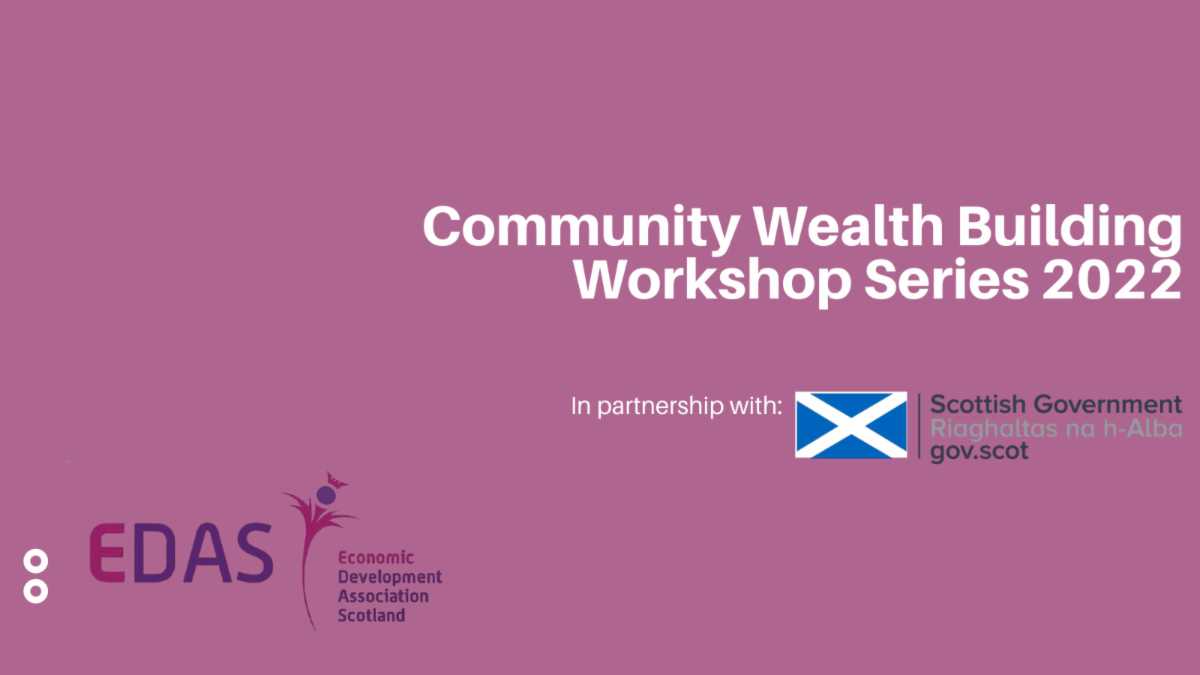
EDAS Community Wealth Building Open Session #1 Event Summary – Turning the Dial
This event welcomed practitioners from across the field of Economic Development to listen to speakers from Scottish Government, including an address from the Minister for Public Finance, Planning and Community Wealth, Tom Arthur MSP. Members then heard from key individuals within local authority pilot projects, followed by local authorities who are now beginning their implementation of Community Wealth Building programmes.
This is the first event in a series, with the next event covering international examples, taking place on 15th February, 3.30pm – 4pm.
Speakers
• Liz McEntee, Chair, EDAS
• Neil McInroy, Community Wealth Building Advisor, Scottish Government
• Tom Arthur MSP, Minister for Public Finance, Planning and Community Wealth
• Mhairi Paterson, Community Wealth Building Coordinator, North Ayrshire Council
• Gordon Mole, Head of Business and Employability, Fife Council
• Stephen Balfour, Project Officer, Planning and Economic Development Services, Community and Enterprise Resources, South Lanarkshire Council
• Calum Iain MacIver, Director for Communities, Comhairle nan Eilean Siar
Summary points for the speakers are available below.
Recording of session
Poll results
View the PDF of our poll results here.
Key points from speakers
Neil McInroy, Community Wealth Building Adviser, Scottish Government
• “Turning the dial” refers to the need now to ramp up activity on strategy, policy and action related to Community Wealth Building.
• Community Wealth Building is not simply a new name for economic development in Scotland, but a new culture and way to reorganize the economy and who it works for.
• It’s not just about redistribution of wealth, but also ‘pre-distribution’ of wealth, and getting right to the heart of system change.
Tom Arthur MSP, Minister for Public Finance, Planning and Community Wealth
• Context of challenges the Scottish economy currently faces; including the pandemic, Brexit, climate crisis, tensions in Eastern Europe and remaining effects of the financial crash. But alongside significant challenges are significant opportunities.
• Reiterates Neil’s comment about it being a culture shift. At the heart of it is redistribution of wealth but also, ‘pre-distribution’ of wealth; having more people in Scotland with more of an ownership stake in the Scottish economy.
• There have been many key successes to date, especially within pilot schemes. Learnings will be pulled from pilots and applied alongside international learnings in the journey towards legislation. The Community Wealth Building Bill will be introduced before the end of this parliament.
Mhairi Patterson, Community Wealth Building Coordinator, North Ayrshire Council
• In North Ayrshire it was clear that traditional forms of economic development weren’t working. Strategy needed to be inclusive, resilient, and sustainable.
• Ayrshire Anchor Charter takes an Ayrshire wide approach with representation from North, South and East Ayrshire Councils as well as key organisations. Eleven new Community Wealth Building roles were also created within North Ayrshire Council.
• Important actions are to challenge traditional forms of thinking and build momentum through quick wins whilst educating about long term strategy.
Gordon Mole, Head of Business & Employability, Fife Council
• Fife Council have had strong buy in to Community Wealth Building from anchor institutions. Now driving towards ‘genuine partnership’ to effect change.
• Council have identified and linked Community Wealth Building actions ‘on the ground’ to tackle other reform priorities such as climate, recovery, inclusion and poverty.
• A number of challenges identified: who takes ownership of actions across anchors and the council; educating workforces, inside and outside of the council, so that employees can be ambassadors for community wealth building through their own actions; capacity building in communities to engage in Community Wealth Building; new legislation will enable organisations to do things differently, this can be tricky within current frameworks.
Stephen Balfour, Project Officer, Planning and Economic Development Services, Community and Enterprise Resources, South Lanarkshire Council
• South Lanarkshire is, comparably, at an earlier stage of the process. Community Wealth Building strategy was launched in March 2021 and the action plan in June 21 comprising 50 high level actions. Focus has therefore been to put the correct foundations in place to ensure future success.
• Actions to date include: Setup of Officers Group to coordinate activity; setup of Commission with more senior council stakeholders, elected members and anchor institutions in health and education; setup of CWB progress group which includes FSB representatives to ensure accountability from all parties; changes made to quick quotes process; educating anchor institutions about benefits; increasing internal conversations across departments (including procurements, services, economic development).
• Next steps include a 1 year report of progress to date, identifying quick wins to increase momentum and use as case studies to encourage further engagement, particularly outside of the council to make it more of a collaborative effort going forward.
Calum Iain MacIver, Director for Communities, Comhairle nan Eilean Siar
• An initial educational exercise was completed, ensuring all elected members understood and bought into the strategy, which consists of 21 actions. An officers group was created with responsible persons assigned these actions. Where necessary, training was provided to officers and Community Wealth Building training has been added to inductions, so that all staff joining the council will have a fundamental understanding.
• A fundamental redraft of the council’s procurement strategy has been agreed. As part of this redraft, the procurement strategy will also tackle populational challenges faced by the area.
• Significant success has been an outcome of facilitating conversations. This includes local community land owners, grazing communities, and private companies creating green jobs. Conversations have resulted in outcomes like increased willingness to release land for housing, new local jobs, green energy to tackle fuel poverty, and potential for community wealth funds.
